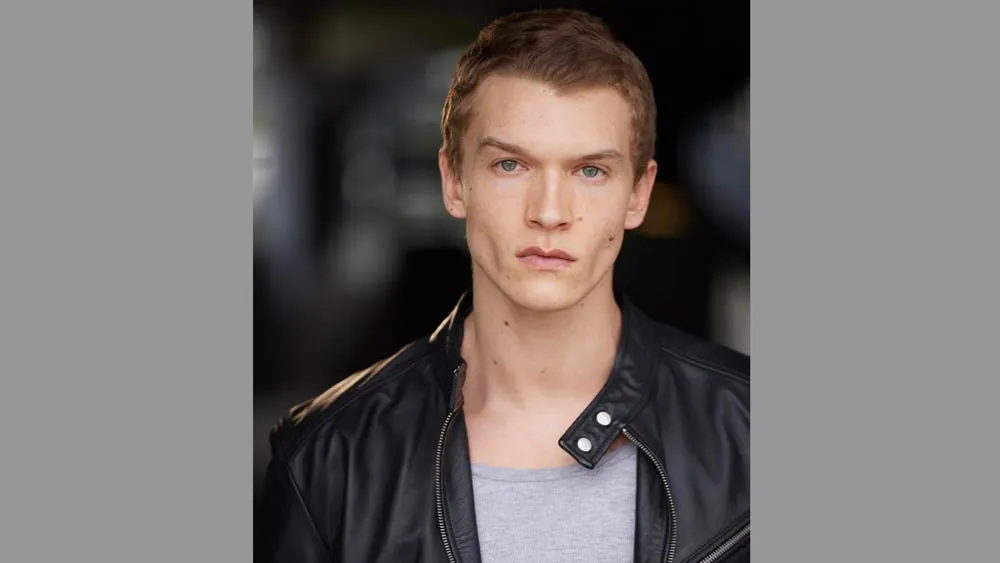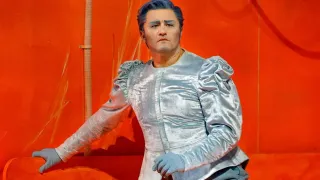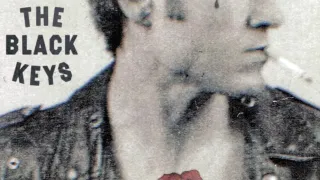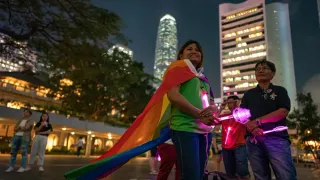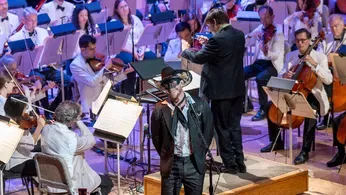
Jun 7
Orville Peck Wows Sold Out Symphony Hall at Boston Pops Pride Night
Robert Nesti READ TIME: 6 MIN.
There were plenty of cowboys -- rhinestone or other, masked or not -- at Symphony Hall on Thursday night. The reason? Alt queer (and masked) country star Orville Peck was making his debut with the orchestra for Pride Night. It was the second Pride Night for the orchestra and that managed to surpass last year's inaugural one, which featured "RuPaul's Drag Race Star" Thorgy Thorn in a memorable display of violin virtuosity and drag fashion. Peck wore a different kind of drag – a striking black and white desperado look topped with a bejeweled cowboy hat. And, of course, his trademark mask that he is never seen without, except, of course, when he's performing as the MC in the current hit revival of "Cabaret" on Broadway. (For the curious, he continues through July 16 in the role he has received considerable acclaim since taking over from Adam Lambert in March.)
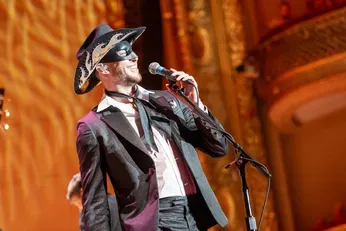
Source: Michael J. Lutch
But with Keith Lockhart and the Pops, his set did not stray from what has made him one of the major queer artists to emerge in the past few years. To their credit, the orchestra scored twice this season in this regard having opened the season with dazzling, and most assuredly queer Cynthia Erivo. That, though, wasn't a Pride concert, and Erivo steered clear of identity politics. Not so Peck, who opened with a cover of the Willy Nelson song "Cowboys Are Frequently, Secretly Fond of Each Other" (written by Ned Sublette) that Peck sang with Nelson in 2024 on his third album "Stampede." Its cheeky take on a "Brokeback Mountain" scenario ("Cowboys are frequently secretly fond of each other/Say, what do you think all them saddles and boots was about?" received a huge response from the sold-out house who joined Peck in singing along.
What followed was a set that showed Peck's growth as an artist with selections largely from his sophomore album, "Bronco," an album that developed his poetic persona of the lonely, rootless modern cowboy. This was beautifully expressed (both in the lyrics and in Peck's use of sweet falsetto) in "Kalahari Down" and "Outta Time," in which his voice soared beautifully upward. He stepped things up with "Any Turn," performed with him on acoustic guitar and the Pops rhythm section, that in a different setting would have had many cowboys in the audience two-stepping.
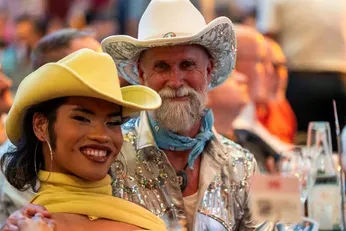
Source: Michael J. Lutch
He concluded his set with a gorgeously performed "Let Me Drown," another cut from his darkly themed sophomore album that expressed a melancholic sentiment in a soaring vocal. And with his first hit "Dead of Night," another song of rootlessness and longing that introduced his amazing falsetto with the line "See the boys when they walk on by," that was mouthed by many in the audience. His encore was Chappel Roan's "Pink Pony Club," which she famously performed at the recent Grammy Awards with cowboys and a huge pink pony. No such props at the Pops, just a heartfelt Peck singing Roan's expressive lyric of belonging, in this case in queer dance club – a place that has been the safe space for queer people since Stonewall.
The lean, handsome Peck has an infectious stage presence. It is little wonder that he's been called by some one of the best MCs in "Cabaret." And his huge pop success cannot not be underestimated in breaking down the barriers between long-thought homophobic country music and queer culture. And that he does it with such suave ease made his appearance at this Pride Night especially memorable.
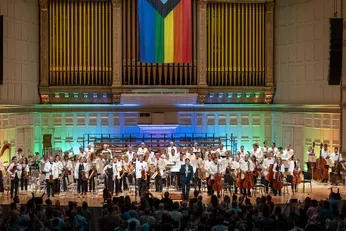
Source: Michael J. Lutch
But Peck wasn't all Lockhart and the Pops had to offer to celebrate queer culture. In the concert's first half, Lockhart opened with a brief, upbeat John Williams piece "To Lenny! To Lenny!" that celebrated the great Leonard Bernstein with a variations on a number of his songs ("New York, New York," Lonely Town") played against a John Williams soundscape with the usual Pops precision. It was enhanced by a video that in four minutes showed Bernstein's enormous celebrity as he is seen hobnobbing with Maria Callas and Jackie Kennedy, and such musical luminaries as Sejii Ozawa and Aaron Copland. Copland followed with the spirited "Hoedown" from his ballet "Rodeo," which Lockhart noted was about as an appropriate classical piece given the presence of Peck. This was followed by two movements from the Boston Pops commissioned piece by gay-adajacent composer Chris Brubeck (son of Dave) that mixed elements of New Orleans jazz, though its place on the program felt odd when there are queer jazz greats like Billy Strayhorn ("Lush Life"), Fred Hersch, and Gary Burton (the latter two with strong Boston ties) whose work could have easily filled the slot. Sometimes gay-adjacent is just not enough.
But is there a celebrity queerer than Judy Garland? In the person of drag impersonator Peter Mac, she joined the concert for two numbers and some hilarious banter. With every gesture and tic in place and a delivery of Garland zingers that could even fool Liza Minnelli, Mac was every inch the diminutive superstar; most notably when she recalled the famous Carnegie Hall concert by sitting on the apron of the stage to deliver a poignant "Over the Rainbow." (I don't believe Garland ever appeared with the Pops, but she had strong Boston ties over her career and gave a historic 1967 concert on the Boston Common that attracted 100,000 to show her appreciation of her fans.)
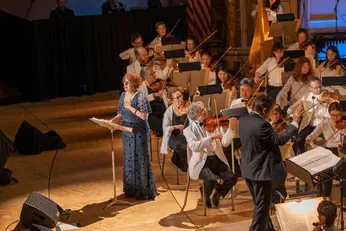
Source: Michael J. Lutch
The concert's first half ended with a new piece, "From Sea to Shining Sea," which celebrated a thought-to-be queer icon from more than a century ago: poet and educator Katharine Lee Bates, the author of "America the Beautiful" The 12-minute film, with an orchestral and choral score by Broadway great Stephen Flaherty, offered an overview of her life and how she came to write her poem while in Colorado observing the Rockies. (The original title was "Pikes Peak.") It proved so popular that there were 55 musical versions of it written. The one with staying power is, or course, by Samuel A. Ward, which Flaherty textured through the piece in a lyrical style reminiscence of his score to "Ragtime." Adapted from John de Graaf's longer film with the same title, the presentation was eloquently narrated by Boston actress Paula Plum.
The enthusiasm of the sold-out house climaxed with Lockhart leading a spirited version of Queen's "We Are The Champions" in which the audience offered a spontaneous and forceful sing-along. This was followed with rainbow streamers and the dropping of the Pride Flag to even more cheers. Happily, it looks like Pride Night with the Boston Pops is here to stay.
